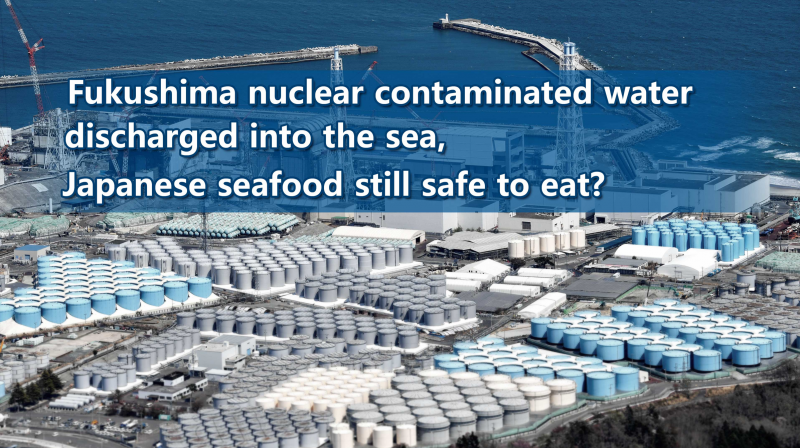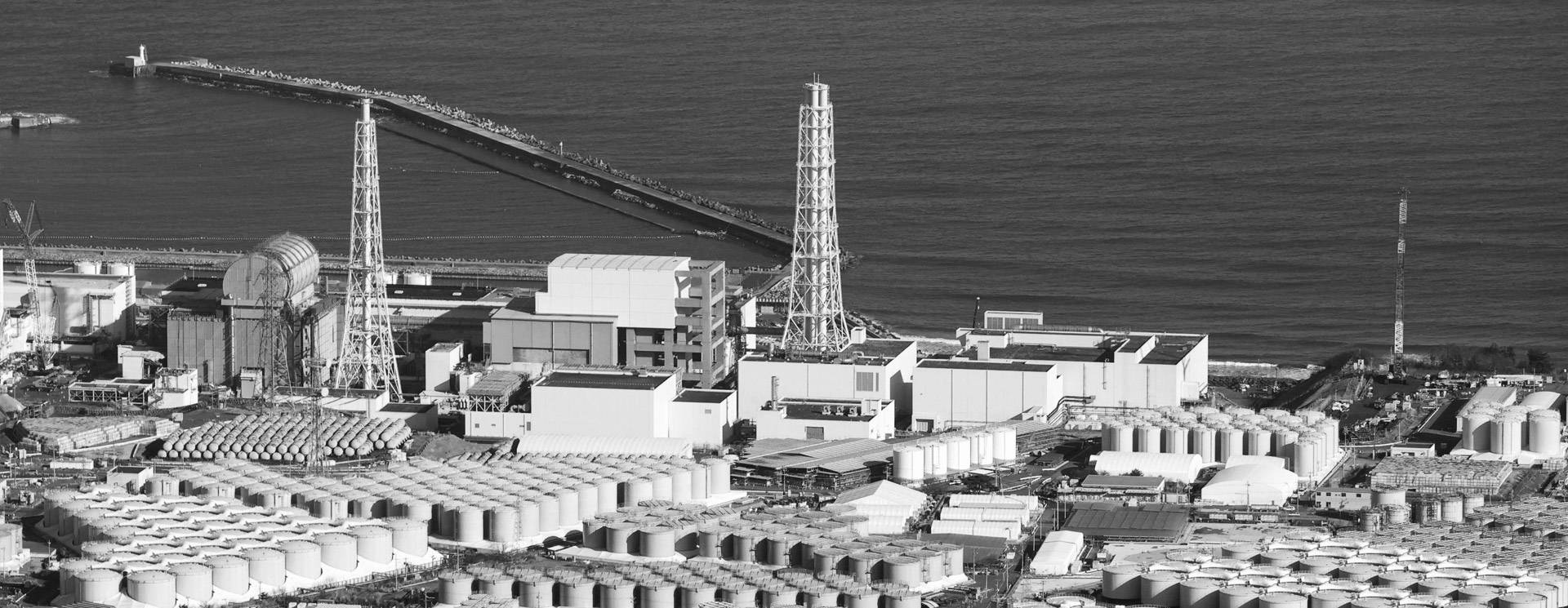
Vedio link: https://mp.weixin.qq.com/s/AbXEfE0YsYBRQCOTJycSpQ
福岛核污染水排海,日本海产品还能安全食用?
主持人:各位,这里是绿色江南《福岛核污染水专题》访谈面对面,我是主持人雨歌。
去年1月底,福岛县相马市沿岸海域捕捞到的许氏平鲉,被检测出放射性物质铯,其活度达到每千克1400贝克勒尔,是日本相关标准的14倍,这种核素进入人体会积聚在肌肉组织中,并有可能增加患癌症的风险。如果多达100多万吨的福岛核污染水排海,势必对日本沿海造成严重污染,那产自日本的海产品又会受到怎样的影响?今天我们邀请到了绿色江南创始人方应君主任为我们解答。
主持人:请问方主任,日本福岛核污染水一旦排海,是否会对日本的海产品造成影响?日本的海产品是否能够安全食用?
方应君主任:之前的访谈中,我们提到过,福岛核污染水中的放射性核素多达1000多种,虽然日本政府采用“多核素去除设备”对核污染水中的放射性核素进行处理,但仍有近70%的核污染水不达标。此前,也有日本媒体指出,除了福岛第一核电站核污染水中的放射性氚难以被多核种去除设备清除之外,该设备处理后的核污染水中还残留氚、碘129和钌106、碳14、钴60和锶90等。这些放射性核素不仅半衰期较长,且普遍具有三致性。
而关于日本海产品核污染的问题,此前,法国辐射防护与核安全研究院曾发布过一份研究报告,证实了放射性物质会以微粒的形式沉淀到海底,且可能会在鱼类体内富集。而日本本土的研究机构有过类似试验,他们采集了福岛核电站附近20海内的19种鱼类,结果经过检测,这19种鱼类体内的放射性物质全部严重超标,甚至还有些物种受辐射影响,大范围的消失。据报道,今年5月在福岛第一核电站港湾内捕获的海鱼许氏平鲉体内放射性核素铯含量达每千克18000贝克勒尔,超过日本食品卫生法所规定标准的180倍。由此可见,含有高放射性核素的130多万吨核污染水一旦排海,带来的后果会有多么的严重,可谓是覆水难收,而且在今后的30年里每天还将新增140吨。
受福岛核事故影响,据日本在参加世界贸易组织有关进口食品安全性的委员会时散发的文件显示,核事故后有54个国家和地区对日本产食品实施进口限制。目前虽有32个国家和地区撤销,但中国、韩国、美国、欧盟等仍在实施限制。韩国海洋水产部官员日前表示,只要福岛海产品的安全性未得到验证,禁止进口措施就无法解除。
由此可见,日本政府选择将福岛核污染水排海,不仅是以破坏海洋生态环境、威胁全球海洋生物和人类身体健康,同时还会对日本本土渔业造成致命的打击,希望日本政府能够及时纠正严重的错误行为、三思而后行,切勿越走越远。
主持人:日本政府近期承诺,将准备300亿日元,相当于人民币15亿元,协助福岛当地渔民应对危机,日本政府的承诺只是维持现状,并没有得到本国渔民们的理解。但福岛核污染水尚未排海,国际上已有22个国家对日本福岛等地的海产品实施限制,一旦正式排海,实施限制的国家会越来越多,且限制的地域也可能扩大。日本此举可以说是治标不治本,更无法保障当地渔民及其家人的后续生活来源。
绿色江南将持续关注福岛核污染水排海计划的进展。
Fukushima nuclear contaminated water discharged into the sea, Japanese seafood still safe to eat? Compere:Ladies and gentlemen, this is Lvse Jiangnan "Fukushima nuclear contaminated water topic" interview face-to-face, I am the Compere Yu Ge. At the end of January last year, cesium, a radioactive substance, was detected in the Hsu's flatfish caught in the coastal waters of Soma City, Fukushima Prefecture, with an activity of 1,400 becquerels per kilogram, which is 14 times that of the relevant Japanese standard, and such nuclides entering the human body will accumulate in the muscle tissues and may increase the risk of developing cancer. If more than 1 million tons of Fukushima nuclear contaminated water is discharged into the sea, it is bound to cause serious pollution to the coast of Japan, and how will the seafood produced in Japan be affected? Today we invited Mr. Fang Yingjun, founder of Lvse Jiangnan, to answer this question for us. Compere: May I ask Mr. Fang whether the nuclear contaminated water from Fukushima, Japan, once discharged into the sea, will have any impact on Japanese seafood? Are Japanese seafood products safe for consumption? Fang Yingjun:As we mentioned in the previous interview, there are more than 1,000 kinds of radionuclides in the nuclear contaminated water at Fukushima, and although the Japanese Government has adopted the "Multi-Nuclide Removal Facility" (MNRF) to treat the radionuclides in the nuclear contaminated water, nearly 70% of the nuclear contaminated water still fails to meet the standard. Previously, the Japanese media also pointed out that, in addition to the radioactive tritium in the contaminated water at the Fukushima Daiichi Nuclear Power Station, which is difficult to be removed by the multi-nuclide removal equipment, tritium, iodine 129 and ruthenium 106, carbon 14, cobalt 60 and strontium 90, etc., also remain in the nuclear contaminated water after the treatment by this equipment. These radionuclides not only have long half-lives, but are also generally tritiated. On the issue of nuclear contamination of marine products in Japan, the French Institute for Radiation Protection and Nuclear Safety had previously released a research report confirming that radioactive substances would be deposited on the seabed in the form of particles and might be enriched in fish. Japan's local research institutions over a similar test, they collected the Fukushima nuclear power plant near the 20 sea within the 19 species of fish, the results of the test, the 19 species of fish in the body of radioactive substances all serious exceeded the standard, and even some species by the disappearance of a wide range of radiation shadow. It was reported that the radionuclide cesium content in the body of the marine fish Hsu's flatfish caught in the harbor of the Fukushima Daiichi Nuclear Power Plant in May this year was 18,000 becquerels per kilogram, which exceeded the standard stipulated in the Food Sanitation Law of Japan by a factor of 180. It can thus be seen how serious the consequences will be once more than 1.3 million tons of nuclear-contaminated water containing high levels of radionuclides are discharged into the sea, which can be said to be irreversible, and 140 tons will be added every day for the next 30 years. As a result of the Fukushima nuclear accident, 54 countries and regions imposed import restrictions on Japanese food products after the accident, according to a document circulated by Japan during its participation in the World Trade Organization Committee on the Safety of Imported Foods. At present, although 32 countries and regions to withdraw, but China, South Korea, the United States, the European Union and other restrictions are still in force. Officials from the South Korean Ministry of Maritime Affairs and Fisheries recently said that as long as the safety of Fukushima seafood has not been verified, the import ban cannot be lifted. From this, we can see that the Japanese Government's choice of discharging Fukushima nuclear contaminated water into the sea is not only aimed at destroying the marine ecosystem and threatening the health of marine organisms and human beings all over the world, but will also deal a fatal blow to the local fisheries industry of Japan. We hope that the Japanese Government will rectify its serious wrongdoing in a timely manner, and think twice before it acts, and do not go further and further away from the goal. Compere: The Japanese government has recently promised to prepare 30 billion yen, equivalent to 1.5 billion yuan, to assist local fishermen in Fukushima to cope with the crisis, and the Japanese government's promise to just maintain the status quo is not understood by its own fishermen. However, the Fukushima nuclear contaminated water has not yet been discharged into the sea, the international community has 22 countries to Japan Fukushima and other places of seafood implementation of restrictions, once the formal discharge of the sea, the implementation of restrictions on the implementation of the country will be more and more countries, and restrictions on the geographical area may also be expanded. Japan's move can be said to treat the symptoms but not the root cause, and even more unable to protect the local fishermen and their family's subsequent source of livelihood. Lvse Jiangnan will continue to monitor the progress of the Fukushima nuclear contaminated water discharge program. 福島原発汚染水の海洋放出、日本の魚介類はまだ安全か? 司会:皆さん、ここは緑色江南「福島原発汚染水特集」対面インタビュー、私は司会の雨歌です。 昨年1月末、福島県相馬市の沿岸海域で漁獲されたクロソイから、日本の基準値の14倍にあたる1kgあたり1400ベクレルの放射性物質セシウムが検出されました。もし100万トン以上の福島原発汚染水が海に流出すれば、日本沿岸に深刻な汚染をもたらすに違いなく、日本で生産される魚介類はどのような影響を受けるのでしょうか?本日は、緑色江南の創設者の方応君主任をお招きし、質問に答えていただきます。 司会:方主任にお聞きしたいのですが、福島原発の汚染水が海に流出した場合、日本の魚介類に影響はありますか? 日本の水産物は安全なのでしょうか? 方応君主任:前のインタビューでも述べたように、福島の汚染水には1,000を超える放射性核種が含まれています。日本政府は原子力汚染水中の放射性核種を処理するために「多核種除去装置」を導入しているが、それでも原子力汚染水の70%近くは基準を満たしていません。以前、日本の一部メディアも、多核種除去設備では除去が困難な福島第一原発の汚染水中の放射性トリチウムに加え、トリチウム、ヨウ素129、ルテニウム106、炭素14、コバルト60、ストロンチウム90なども、この設備による処理後も原発汚染水に残留していると指摘していました。これらの放射性核種は半減期が長いだけでなく、一般的には三致性を持っています。 日本における海産物の核汚染問題について、フランスの放射線防護原子力安全研究所は以前、放射性物質が粒子の形で海底に沈着し、魚の体内に濃縮される可能性があることを確認する研究報告書を発表しました。日本の地元研究所が行った同様の実験では、福島原発近海の20の海から19種の魚を採取し、その結果、これら19種の魚の体内の放射能が深刻な基準値を超えていました。放射線の影響を受け、広範囲にわたって姿を消した種もあります。今年5月、福島第一原発の港で捕獲された海産魚クロソイの体内セシウム濃度が1kgあたり18,000ベクレルと、食品衛生法で定められた基準の180倍以上であったことが報告されました。このことから、高濃度の放射性核種を含む原子力汚染水が130万トン以上も海に放出されれば、いかに深刻な事態になるのかがわかります。さらに、今後30年間で日量140トンが追加される予定されているようです。 世界貿易機関(WTO)の「輸入食品の安全性に関する委員会」に日本が参加した際に配布された文書によると、福島原発事故の結果、54の国と地域が事故後に日本産食品の輸入制限を課しました。現在、32の国と地域が撤回したものの、中国、韓国、米国、欧州連合(EU)、その他の制限はまだ有効です。韓国海洋水産省の関係者は最近、福島の水産物の安全性が確認されていない限り、輸入禁止を解除することはできないと述べました。 このように、福島原発の汚染水を海に流すという日本政府の選択は、海洋生態系を破壊し、世界中の海洋生物と人類の健康を脅かすことを目的としているだけでなく、日本の地元水産業に致命的な打撃を与えるものであることがわかります。日本政府は深刻な誤った行為を是正し、よく考えてから行動することを求めます。 司会:日本政府は近く、福島の地元漁民の危機対応に協力するために300億円を用意すると約束したが、日本政府の約束は現状維持で、自国漁民の理解を得ていないです。福島の核汚染水はまだ海に排出されていないうち、国際的には22カ国が日本の福島などの海産物に規制をかけており、本格的に海に排出されれば規制を実施する国が増え、規制する地域も拡大する可能性があります。日本のこの動きは、根本的な解決策がなく、地元の漁民やその家族の後続の生活源を保障することができないと言えます。 緑色江南は福島核汚染水排出計画の進展に引き続き注目しています。
Contentsource: PECC WeChat public account
